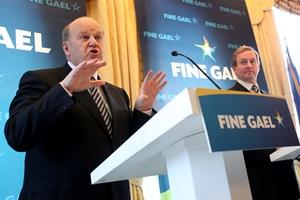Public spending cuts are a political choice

Recent cuts in spending and taxation increases have been blamed on the terms of the EU-IMF bailout. But is the Goverment simply using this as an excuse to deflect blame away from themselves asks Michael Taft.
A neighbour described to me a local community meeting where it was announced that the local Garda station would be closed. Why, the residents asked? A local councillor answered: "Because of the EU-IMF bailout". Of course, closure of Garda stations are not in the EU-IMF Memorandum of Understanding. But that’s not the point, is it?
It is convenient for Ministers to hide behind the EU-IMF deal. Special Needs Assistants? EU-IMF. Cutting fuel allowances? EU-IMF. Flat-rate household charges? Cutting low-paid wages? Shoving people off the dole? EU-IMF. EU-IMF. EU-IMF.
No need to defend such actions on efficiency grounds, or as a result of choice. Just blame someone else. In this way, the Government hopes to avoid debate. For if there is no choice, what’s the point of the debate? If it’s raining, what’s the point of debating which condiments to bring to the barbeque?
So, when the Tanaiste warns that the cuts to come in the next two Budgets are going to be "painful" for ordinary people, claiming "We don’t have a choice as a country", he is using an argument of convenience. But is he correct? Is there really no choice?
Not according to the Minister for Finance. Michael Noonan recently told the Dail:
"the IMF and the European partners made it quite clear, and we assented quite willingly, that whatever changes we made to the conditions in the memorandum of understanding would be fiscally neutral. In other words, if we substituted a range of measures, whether taxes or expenditure savings, by another range of measures, the fiscal impact would be the same. That is the position... We will not resile from any commitment we made given that one set of measures will be substituted by another set of measures of equal value or, to put it more correctly, equal fiscal impact."
This is an important statement in two respects, which also flatly contradicts the 'we-have-no-choice' argument put forward by other Ministers.
First, the Finance Minister refers to "changes we made", not changes agreed with what are called "our paymasters". As long as the condition of fiscal neutrality is maintained, the Government has choices – considerable choices. For instance, it could avoid spending cuts next year of €2.1 billion by simply introducing less deflationary tax measures on high-incomes and capital (thus allowing public sector savings to be reinvested into expanding public services at no extra cost to the Exchequer, as argued here).
The Government has already exercised considerable discretion under this heading. In the Jobs Initiative the Government cut employers' PRSI and VAT, abolished the travel tax and (marginally) increased capital spending. This extra expenditure was balanced by the pension levy. None of this was in the EU-IMF deal. Nor was reversing the minimum wage cut. And while the EU-IMF deal specifically stipulates income tax increases in this budget and the next, the Government has announced it will not be bound by this provision.
All this was done in the first few weeks of office – so much for the claim that the Government has no choice.
The second important point the Minister makes is that the substitution of fiscal measures (e.g. taxation for spending cuts) does not need to be of equal "value" but, rather equal "fiscal impact". In other words, as long as the substituted measures reduce the deficit by an equal amount, the value is not important. Let’s take an example from the ESRI:
- Cutting public sector employment by €1 billion (i.e. 17,000 jobs) will reduce the deficit by 0.2 percent of GDP
- Raising €400million through a property tax will reduce the deficit by 0.2 percent of GDP
So even though the value of the property tax consolidation is substantially less than the spending cut (€600 million), this doesn’t matter because the impact on the deficit is the same. Therefore, the Government need not bring in a fiscal consolidation package of €3.6 billion next year. It only need bring in a package that will reduce the deficit to the same extent.
What it also means is that the Government is in charge of this process – that it can make alternative choices outside the EU-IMF memorandum of understanding. It can choose to raise taxes, it can choose to cut spending, it can choose to increase investment (for investment is a tool of fiscal consolidation). The only condition is that the fiscal impact remains the same.
This is not to say that the Government has limitless choices – but this is a truism at any time. All governments operate under limitations. The point is to explore what those limitations are, to measure them and to find the most fiscally efficient and least economically damaging. In a nutshell:
- Cutting public spending is a political choice
- It is not an economic or fiscal necessity
- Nor is it required under the EU-IMF deal
Cutting fuel allowances, increasing public transport fees,introducing flat-rate household charges – these are political choices that the Government can make or not make. So the next time you hear a Minister insisting on "savage" cuts, "deep, painful and unpalatable cuts", they have decided to do it that way.
They do, after all, have a choice to do something different. And far, far better.
